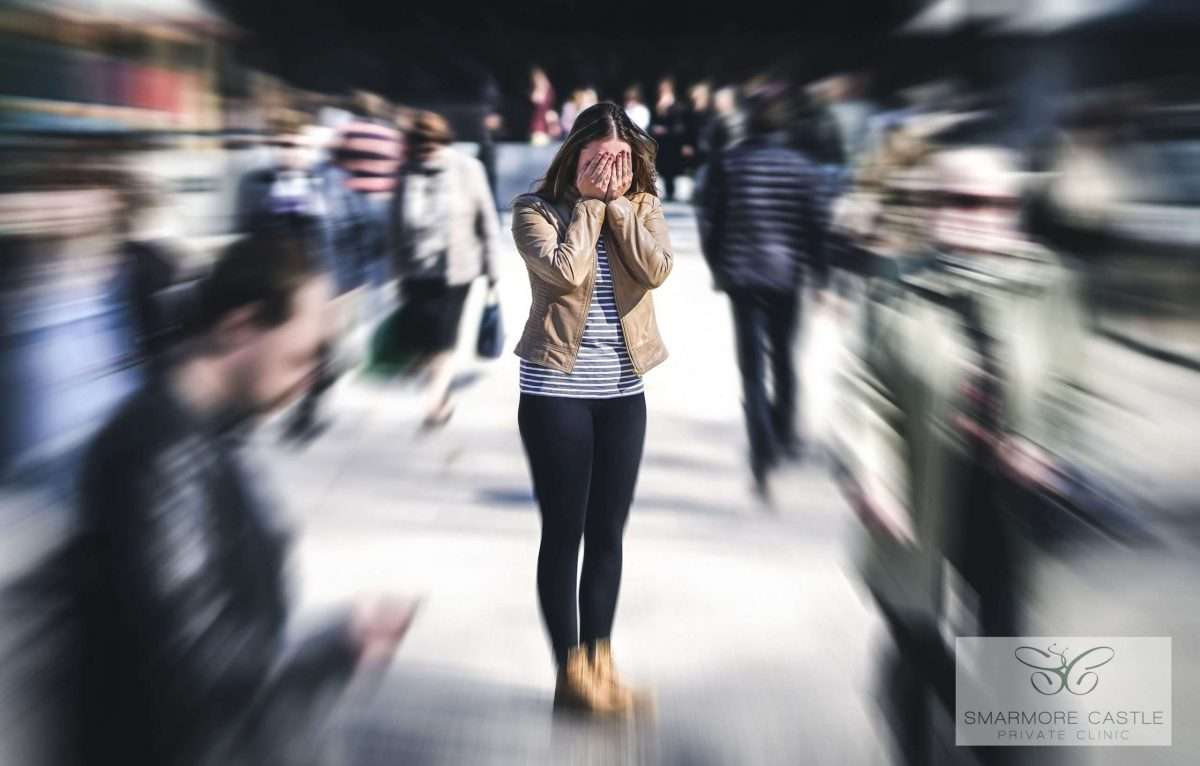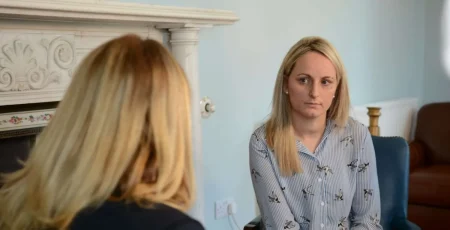Table of Contents
Alcohol and Anxiety: Panic Attacks After or During Drinking
Are you suffering from alcohol-induced panic attacks?
Consuming alcohol can trigger panic attacks, while others experience extreme nervousness after drinking.
However, regular panic attacks induced by alcohol are a serious matter that can lead to addiction.

Download our Brochure
If you start drinking and cannot always stop or predict the outcome, you might need professional help.
Why Does Alcohol Cause Panic?
Many stimulants, including alcohol, result in a relative rise in adrenaline and a delayed increase in noradrenaline concentration.
Noradrenaline is a chemical produced naturally by your body to remove adrenaline when it is no longer required.
A rise in adrenaline can make you lively, so intoxicated people are often loud and active at first.

However, if you are susceptible to panic, it can also increase anxiety.
Alcohol only adds more fuel (adrenaline) to the fire.
The results are a full-blown panic attack, which can be very frightening.
Why Panic Attacks Occur
Often when drinkers experience panic attacks, they drink more to combat the fear.
Technically they’re drinking more alcohol to get their brain to block ‘glutamate’. Less glutamate in the brain means less fear.
A panic attack can occur as a result of the following:
- Drinking faster than ordinary people
- Consuming more than two drinks
- Drinking regularly – more than is recommended by the HSE
Our medical opinion is that if you frequently get panic attacks after drinking alcohol, then it is essential to take a good look at your drinking, how much you drink, and why.
Is Your Drinking Costing You More Than Money?
Schedule a FREE alcohol addiction assessment with one of our supportive rehab admission experts.
Our understanding experts can speak to you for 30 minutes at a time and day of your choice.
From here, we can advise you on the best next steps and suitable rehabs to seek treatment.
Request an alcohol assessment here.
Alcohol-induced Panic Attacks: Are They a Sign of Addiction?
Six-point cycle: evidence to suggest the brain has been affected:
- Increase in the frequency of panic attacks
- Increase in severity of anxiety levels
- Panic attacks during a hangover
- Increased levels of anxiety when drinking
- Irritable, restless and dissatisfied
- The need for more and more alcohol to relax
As you will see from the cycle above, anxiety and alcohol function together.
Over time, this can cause a person to drink more, thus creating dependence and possible alcohol addiction.
When you use alcohol as a form of self-medication, you open yourself to dependency.
Although the alcohol may feel like it’s helping, the drink is only a crutch.
The ‘reason’ behind the anxiety is the driver for more drinking. Hangovers are mercifully short.
It’s not the drink that makes you drink, but the thoughts and emotions about aspects of your life that need treating.

What Can You Do?
Alcohol is a drug that attacks the body’s nervous system, which, over time, can manifest through symptoms such as tremors, hallucinations, and feelings of anxiety.
These particular symptoms are referred to as ‘delirium tremens’ (DT’s) in extreme cases.
Suppose you drink regularly and reach a point where panic attacks have become routine. In that case, our medical professionals and psychiatrists are likely to suggest that this could signify a psychological dependency on drink.
Therapy, time out, and abstinence can help treat this.
If you struggle to cut down your drinking despite numerous panic attacks and overwhelming anxious feelings/anxiety hangovers, it might be the right time to seek residential help.
At Smarmore, we can advise you on what help is available – both free and paid for, what type of therapy you may benefit from, and how severe your problem is.

Safe Detoxification from Drugs & Alcohol
More on Anxiety and Alcoholism Cycle
Intense anxiety is very unpleasant and can cause anyone to drink.
In turn, alcohol makes you more anxious and on edge. You then drink more to calm this heightened anxiety.
Hence, the start of a long and complex cycle; the two trigger each other.
The effects of alcohol can negatively impact hormones, brain function, and sleep.
These three things are essential for keeping you stable and of sound mind.
Anxiety Hangovers
Hangxiety is more than just your regular hangover.
It is intense nervousness and discomfort that can affect your ability to function correctly and cause you to ignore your obligations and responsibilities.
Whilst nights of heavy drinking or binge drinking can trigger anxiety, those who have an alcohol addiction will notice that their anxiety is triggered more intensely and are likely to experience worse panic attacks and higher daily anxiety levels.

Signs of Hangxiety
Similar symptoms to those seen in panic attacks:
- A rise in heart rate
- Sweating, not from heat
- Nausea (feeling sick)
- Shaking or trembling/Paranoia or feelings of unreality
- Feelings of intense fear
As you go through these physical sensations, your brain will think that you are panicked and might trick itself into having an actual panic attack.
More on Panic and Alcohol
- Can alcohol cause panic attacks? Drinking alcohol has been shown to contribute to anxiety, which can cause panic attacks. However, alcohol only creates panic attacks in people who have a possible anxiety disorder. Otherwise, no one would ever drink.
- Why does alcohol trigger panic attacks? If you suffer from any form of anxiety or panic disorder, like many across Ireland, then alcohol can trigger a panic attack. Aside from adrenaline, this is also because alcohol alters the level of serotonin and neurotransmitters in the brain. As a result, this tends to worsen anxiety symptoms and can make you feel more anxious once the alcohol wears off (referred to as anxiety hangovers). Once you enter into this vicious circle, it can be challenging to break free. Drinking on fear is unpleasant and doesn’t work.
- How can I calm my anxiety after drinking? Drink less, get plenty of sleep, eat the right foods, and rehydrate. However, this may do little to alleviate symptoms. The best remedy would be to stop drinking. If you have panic attacks whilst drinking, this may indicate an unresolved issue. Failing to adequately address something that is upsetting can leave your anxiety in an unmanageable state, and alcohol won’t help at all. In Alcoholics Anonymous, this is the jumping-off place where you can’t live without a drink.
- Does alcohol increase anxiety? In many cases, prolonged and continued drinking can cause anxiety, even if no anxiety disorder initially occurs. Those drinking to calm their anxiety may experience more stress as a result. The brain can be trained to believe that only a drink will help. As with all drugs, whatever they do for you, they will take away when the effect wears off—causing people with hangovers to be stressed and snappy.
According to the HSE, moderate drinking can also cause anxiety to intensify after a few hours.
Often alcohol intensifies the initial state of the drinker, so if you are feeling particularly anxious, you can expect this to heighten during your drinking.

Stop Drinking, No More Panic
If you experience panic attacks after or during drinking, it is recommended that you consider remaining sober.
If this sounds impossible and you can’t stop turning to alcohol to manage your anxiety, an inpatient rehab treatment facility might be your best option.
Here, you will also learn how to live without alcohol, manage anxiety healthily and live a sober life free of pain and suffering.
We have treated over 1,000 patients to date.
There are outpatient options too for those not wishing to attend an inpatient facility.
Alcohol Help
Contact Us Today
Start your Recovery Journey with Smarmore Castle Clinic



